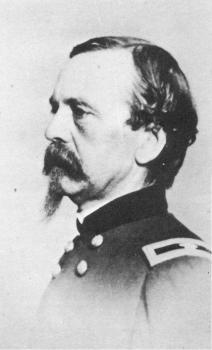

Daniel Edgar Sickles (1825-1914) was a native of New York City, born on October 20th, 1825. He was a lawyer and a politician. He served in the state legislature, was corporate counsel for the City of New York, and secretary of the American legation in London under minister James Buchanan. He also served two terms in the US congress.
It was not uncommon in Victorian Washington for married women to be escorted by bachelors to the social functions of the city and Sickles wife was no exception. She became acquainted with Philip Barton Key, son of Francis Scott Key author of the lyrics of the Star Spangled Banner. Mrs. Sickles and Key became lovers, which outraged the future Civil War General. Sickles himself had had several affairs while in Washington.
On February 25th, 1859 Sickles publicly shot and killed Key. Sickles was jailed and the national press followed the story. He was eventually acquitted on the grounds of temporary insanity, setting a legal precedent. Scandalized, Sickles sent his wife and daughter back to New York to live with her parents, while he stayed in Washington.
His political career began to falter at this point but fortunately for him the war began. Sickles raised the Excelsior Brigade out of New York as commander he became a Brigadier General. He was successful in his command of the brigade at the Peninsula and in November of 1862 became a Major General. He commanded the Second Division, Third Corps at Anietam and Fredricksburg and received command of the Third Corps with Hooker's promotion to command of the Army of the Potomac. Sickles was aggressive at Chancellorsville and led the Corps to Gettysburg.
After the war General de Trobriand, who served under him in the Third Corps wrote:
|
He was gifted in a high degree with that multiplicity of faculties which has given rise to saying that a Yankee is ready for everything... He has a quick perception, an energetic will, prompt and supple intelligence, and active temperament. Naturally ambitious, he brings to the service of his ambitions a clear view, a practical judgement and a deep knowledge of political tactics. When he has determined on anything, he prepares the way, assembles his forces, and marches directly to the assault. Obstacles do not discourage him... he has many strings in his bow, if one breaks he will replace it by another.
In him, ability does not exclude frankness. He likes, on the contrary, to play with his cards on the table with his friends and against his enemies.
|
At the height of the fighting on the second day at the Battle of Gettysburg with his line being broken up and driven back Sickles was hit in the right knee by a round shot. Concerned about how his troops would feel to see their commanding general wounded he propped himself up on his stretcher and calmly smoked a cigar as he gave words of encouragement to those that saw him as he was carried off the field. That night his leg was amputated above the knee in the Third Corps' field hospital.
Dr. Sim, the Third Corps surgeon, decided that Sickles should leave the field hospital immediately and go to Washington. Dr. Sim did not want his important patient transported in an ambulance. A force of forty Third Corps soldiers to act as stretcher-bearers, an escort of cavalry, a couple of wagons to carry supplies and baggage, Dr. Sim and members of Sickles staff, carried the General on a stretcher to an awaiting railroad car eight miles away. By July 5th Sickles was in Washington. A few days later he was being visited by Lt. Col James F. Rusling, the quartermaster of the Third Corps, when President Lincoln and his son Tad arrived. Rusling was present and listened to their conversation, according to Rusling:
|
Sickles, recumbent on his stretcher, with a cigar between his fingers, puffing it leisurely, answered Mr. Lincoln in detail, but warily, as became so astute a man and soldier; and discussed the great battle and its probable consequences with a lucidity and ability remarkable in his condition then - enfeebeled and exhausted as was by the shock and danger of such a wound and amputation. Occasionally he would wince with pain, and call sharply to his orderly to wet his fevered stump with water. But he never dropped his cigar, not lost the thread of his narrative, nor missed the point of their discussion... He certainly got his side of the story of Gettysburg well into the President's mind and heart that Sunday afternoon; and this doubtless stood him in good stead afterward, when Meade proposed to court-martial him for fighting so magnificently, if unskillfully (which remains to be proved), on that bloody and historic July 2nd.
|
It is unclear as whether or not Meade wanted him court-martialed, he was never brought up on charges. On October 30, 1897, Sickles was awarded the Medal of Honor for his actions on July 2nd, 1863, quoting from his citation, "Displayed most conspicuous gallantry on the field vigorously contesting the advance of the enemy and continuing to encourage his troops after being himself severely wounded."
Oh...and where is General Sickles' leg? It is on display at the National Museum of Health and Medicine in Washington DC.
|